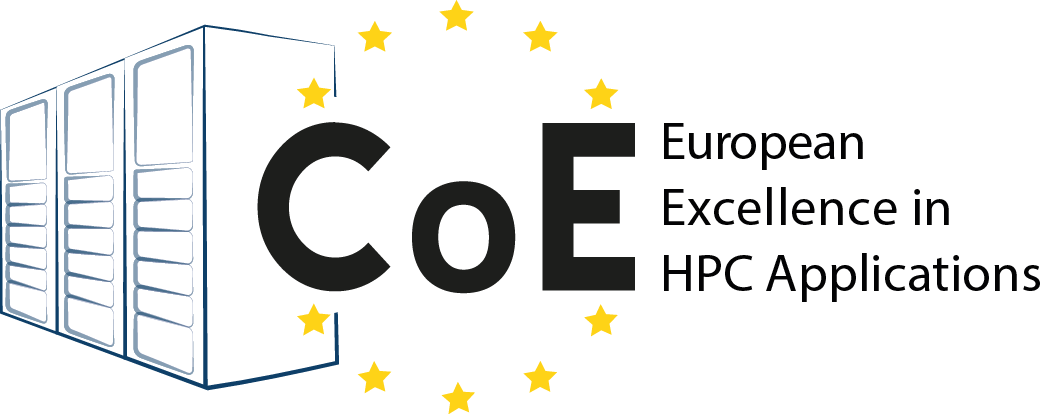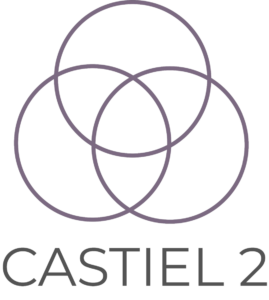
The recent HiPEAC Conference in Barcelona brought together a remarkable convergence of expertise and innovation in high-performance computing (HPC). Between January 20-22, 2025, workshops organized by 16 European Centres of Excellence (CoEs) tackled the pivotal transition from petascale to exascale computing, showcasing the collaborative power of the European HPC community.
Women Leading HPC
The workshops were designed not only to address technical challenges but also to defy norms in a field where the contributions from women and people from historically marginalized backgrounds often go unnoticed. From early-career researchers to established leaders, the speakers represented the depth and diversity of talent shaping the present and future of HPC.
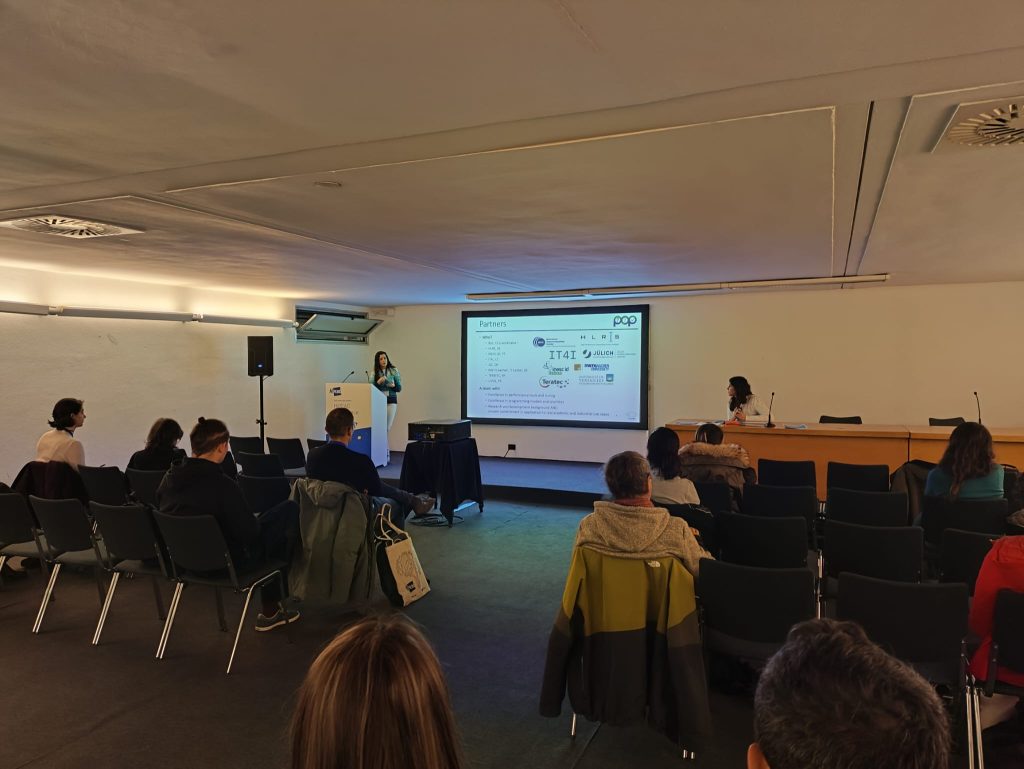
Marta García-Gasulla, one of the main organizers of the workshops and a researcher at the POP3 Centre of Excellence with her presentation on lessons learned and challenges in assessing European HPC codes. // Photo by Elisabetta Boella.
ChEESE researchers on HiPEAC
Alejandra Guerrero, ChEESE researcher from GEO3BCN-CSIC presented on ash fallout assessment in the HPC era, highlighting the role of advanced computational tools in natural hazard research.
Arnau Folch, ChEESE PI from GEO3BCN-CSIC, contributed to the roundtable on the future challenges of HPC alongside other prominent leaders.
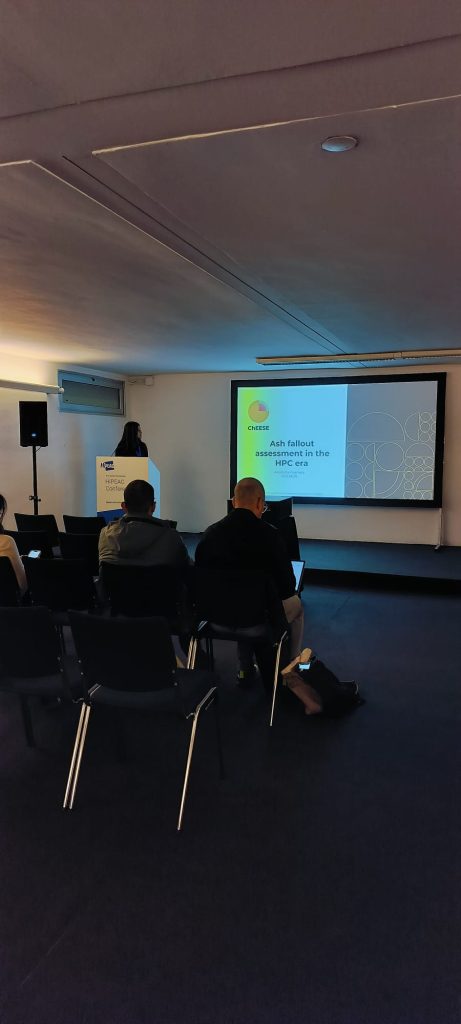
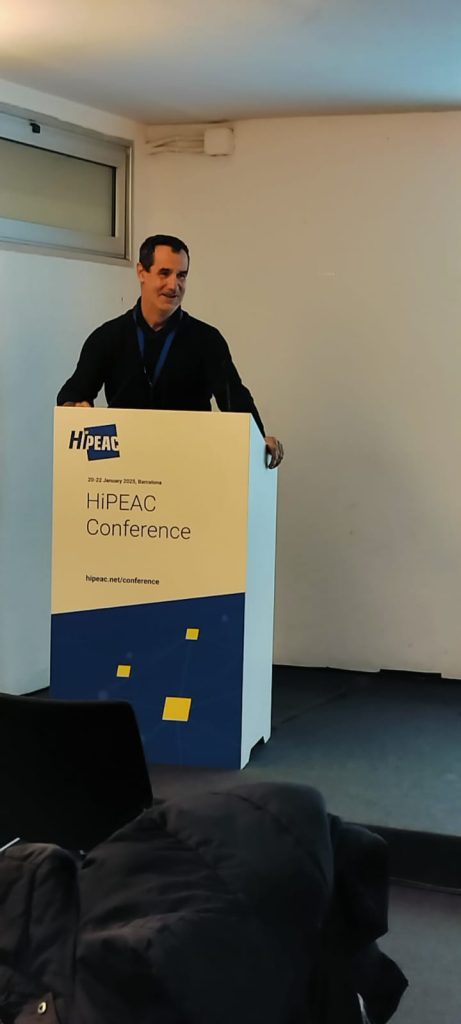
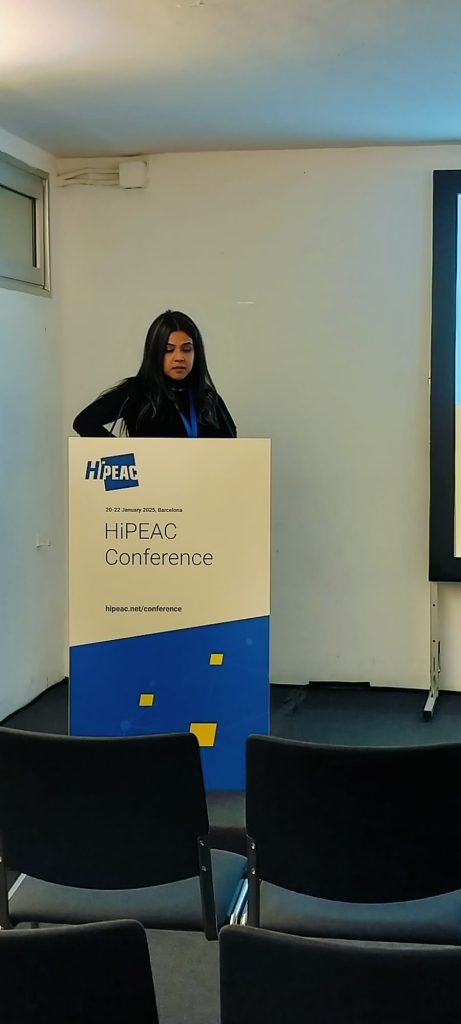
Photos: Elisabetta Boella (E4) & Rosa Rodríguez (BSC-CNS)
A Platform for Collaboration
The workshops brought together projects addressing varied domains like climate, energy, and materials science, reinforcing the significance of interdisciplinary collaboration. The event emphasized the strategic importance of sharing expertise, as seen in sessions on EuroHPC CoEs’ collective roadmap and enhanced access to HPC training through initiatives like CASTIEL2.
As HPC advances toward exascale capabilities, events like the HiPEAC conference reaffirm the critical role of collaboration across institutions, disciplines, and borders. This gathering demonstrated the collective capacity of Europe’s research community to address some of the most complex scientific and societal challenges of our time.
Open Call for Proposals to Advance Europe’s Weather and Climate Models for Pre-Exascale Systems
- The ESiWACE3 Consortium is excited to announce an open call for proposals: “Collaborations to prepare Europe’s Weather and Climate Models for pre-exascale Systems.”
- This service offers collaborative projects in which ESiWACE experts provide advice and engineering effort to the applicant. This call aims to support the exascale preparations for the European Earth-System Models (ESM) community. Read more about the call here.

New Online Laboratory for Data Compression
- As part of the ESiWACE3 Centre of Excellence, our researchers have developed the second public version of the Online Laboratory for Data Compression tailored to climate science and meteorology. This initiative is complemented by the release of specialised datasets designed to test various compression methods on outputs from both weather and climate models. Read more.
ESiWACE3 celebrates its 3rd General Assembly
- The 3rd General Assembly of the 3rd phase of the European Centre of Excellence in Weather and Climate Simulations was organized in person by the leading institution, the Barcelona Supercomputing Center-Centro Nacional de Supercomputación (BSC-CNS), and hosted by our partners, Deutsches Klimarechenzentrum GmbH (DKRZ). Read more.

Upcoming Events
CASTIEL2 Code of the Month #14: February 19, 2025 at 9:30 CET
- In the next issue of Code of the Month, Juniper Tyree will talk about “Online Laboratory for Climate Science and Meteorology, and associated Online Compression Laboratory”. Register now.
Deployment of HPCW from ESiWACE3 at the 6th MareNostrum5 Hackathon
From 7 to 9 October, the Barcelona Supercomputing Center-Centro Nacional de Supercomputación (BSC-CNS) celebrated its 6th MareNostrum and our team from HPCW- The High Performance (Climate&Weather Benchmark took part, using the opportunity to work on HPCW, a domain-specific benchmark that provides a set of relevant and realistic near-operational weather and climate workloads. Read the HPCW article!
External stakeholders CoEs Success Story
ESiWACE3 has two services. Read a success story about Service 1: “Collaborations to prepare Europe’s weather and climate models for pre-exascale systems” – focused on porting and refactoring weather and climate models to new computing architectures, such as GPUs. Read the ESiWACE-3 story!
Upcoming Events
Extrae and Paraver: Profiling Weather and Climate Applications: January 27th, 2025
The NCC for HPC in Austria and ESiWACE3 are organizing a one-day training on BSC performance analysis tools, Extrae and Paraver, for profiling weather and climate models in HPC. The course includes theory and hands-on labs, covering trace analysis, performance tuning, and optimization for various programming models. Register for ESiWACE training!
From petascale to exascale and beyond: The Centres of Excellence challenge: January 20, 2025
Workshop organized within the HiPEAC conference. The HiPEAC 2025 conference will take place in Barcelona, Spain. Associated workshops, tutorials, special sessions, several large poster session and an industrial exhibition will run in parallel with the conference. More on ESiWACE at HiPEAC!
Data analytics for engineering data using machine learning (Fraunhofer SCAI + HLRS): March 10-12, 2025.
This three-day online workshop addresses the preparation, analysis and interpretation of numerical simulation data by machine learning methods. Besides the introduction of the most important concepts like clustering, dimensionality reduction, visualization and prediction, this course provides several practical hands-on tutorials using the python libraries numpy, scikit-learn and pytorch as well as the SCAI DataViewer (see also the SimExplore tool). Register for data analytics with ML!
MaX codes achieve performance and scalability on different EuroHPC architectures
MaX released its “Performance and Scalability” brochure, gathering the latest results of the MaX codes in achieving performance and scaling on different EuroHPC systems. Download a copy!

MaX codes deployed on different EuroHPC architectures
MaX codes are running on different EuroHPC systems with high parallel efficiency. In many cases, codes are deployed and the modules are available to users or demonstrated by the developers and ready for installation. Learn more about the MaX codes!

Upcoming Events
CASTIEL2 “Code of the Month” series with MaX code SIESTA: December 11, 2024.
The webinar will feature MaX code SIESTA: a high-performance software used by researchers in geosciences, biology, and engineering, apart from materials physics and chemistry. Further details online.

Harvesting energy consumption on European HPC systems: Sharing Experience from the CEEC project
Measuring energy to solution is just as important but more complicated and less familiar than measuring time to solution. Now you can learn how it works in our best practice guide for Euro HPC systems.
CEEC and the European Processor Initiative: An Explainer Podcast Episode
Our latest explainer post is an episode in the new Supercomputing in Europe podcast about CEEC work with the European Processor Initiative (EPI). Learn about co-design benefits and more in the interview!
Upcoming Events
Call for Abstracts! High-fidelity CFD with application in ship hydrodynamics: December 15,2024.
Submit an abstract to our session at Marine25! The deadline for submissions to the session titled “High-fidelity CFD with application in ship hydrodynamics” is December 15, 2024. Details for Marine25 are Online.
Programming complex workflows with PyCOMPSs: December 16, 2024.
Programming large-scale systems poses several challenges to scientific application developers. Join us for a webinar on PyCOMPSs, a pioneering approach to task-based programming in Python that enables codes to be executed in distributed computing platforms. Register for PyCOMPSs!
This three-day event includes in-depths training on the flagship EoCoE codes and solvers, which focus on HPC simulations applied to energy domains. These codes and solvers are designed and optimized to run on the latest European pre-exascale machines, and will ultimately be scaled to the upcoming exascale systems.
The school is aimed at scientists and researchers from academia and industry from across Europe, it will allow participants to test their mastery of these codes on the EoCoE Software as a Service Portal, using the computing resources of the Poznań Supercomputing and Networking Center (PSNC).
An EoCoE team of researchers from several prominent European research centres will host the training sessions and supervise the work of School participants. This event will focus on material science, weather forecast and climate change plus the software and algorithm expertise.
A strong participation to the EoCoE School will be rewarded with certification and several awards. To evaluate whom this award will go to, participants are asked to describe their goals regarding the EoCoE codes on registration to the School, and also hosts will assess their participation during the sessions.
Agenda and registration at the following link: https://indico3.conference4me.psnc.pl/event/8
IPDPS is an international forum for engineers and scientists from around the world to present their latest research findings in all aspects of parallel computation. In addition to technical sessions of submitted paper presentations, the meeting offers workshops, tutorials, and commercial presentations & exhibits.
IPDPS represents a unique international gathering of computer scientists from around the world. Now, more than ever, we prize this annual meeting as a testament to the strength of international cooperation in seeking to apply computer science technology to the betterment of our global village.
Each year, SC provides the leading technical program for professionals and students in the HPC community, as measured by impact, at the highest academic and professional standards.
The Program is designed to share best practices in areas such as: algorithms; applications; architectures and networks; clouds and distributed computing; data analytics, visualization, and storage; machine learning and HPC; performance; programming systems; system software; and state of the practice in large-scale deployment and integration.
